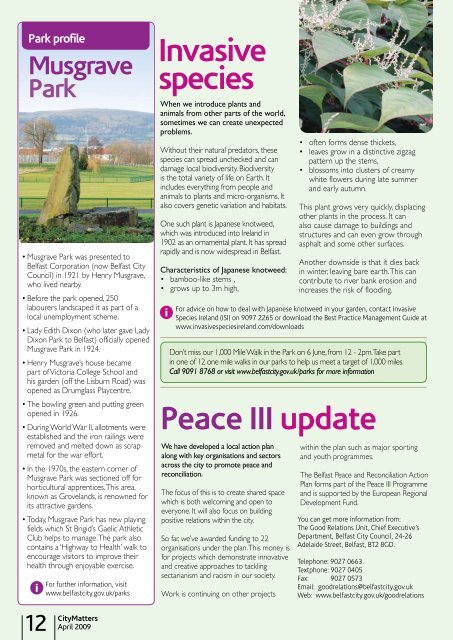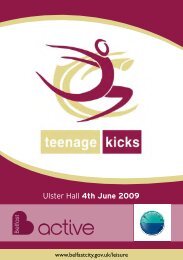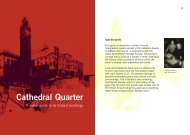Geraldine Hughes - Belfast City Council
Geraldine Hughes - Belfast City Council
Geraldine Hughes - Belfast City Council
Create successful ePaper yourself
Turn your PDF publications into a flip-book with our unique Google optimized e-Paper software.
Park profile<br />
Musgrave<br />
Park<br />
• Musgrave Park was presented to<br />
<strong>Belfast</strong> Corporation (now <strong>Belfast</strong> <strong>City</strong><br />
<strong>Council</strong>) in 1921 by Henry Musgrave,<br />
who lived nearby.<br />
• Before the park opened, 250<br />
labourers landscaped it as part of a<br />
local unemployment scheme.<br />
• Lady Edith Dixon (who later gave Lady<br />
Dixon Park to <strong>Belfast</strong>) officially opened<br />
Musgrave Park in 1924.<br />
• Henry Musgrave’s house became<br />
part of Victoria College School and<br />
his garden (off the Lisburn Road) was<br />
opened as Drumglass Playcentre.<br />
• The bowling green and putting green<br />
opened in 1926.<br />
• During World War II, allotments were<br />
established and the iron railings were<br />
removed and melted down as scrap<br />
metal for the war effort.<br />
• In the 1970s, the eastern corner of<br />
Musgrave Park was sectioned off for<br />
horticultural apprentices. This area,<br />
known as Grovelands, is renowned for<br />
its attractive gardens.<br />
• Today, Musgrave Park has new playing<br />
fields which St Brigid’s Gaelic Athletic<br />
Club helps to manage. The park also<br />
contains a ‘Highway to Health’ walk to<br />
encourage visitors to improve their<br />
health through enjoyable exercise.<br />
For further information, visit<br />
www.belfastcity.gov.uk/parks<br />
12 <strong>City</strong>Matters<br />
April 2009<br />
Invasive<br />
species<br />
When we introduce plants and<br />
animals from other parts of the world,<br />
sometimes we can create unexpected<br />
problems.<br />
Without their natural predators, these<br />
species can spread unchecked and can<br />
damage local biodiversity. Biodiversity<br />
is the total variety of life on Earth. It<br />
includes everything from people and<br />
animals to plants and micro-organisms. It<br />
also covers genetic variation and habitats.<br />
One such plant is Japanese knotweed,<br />
which was introduced into Ireland in<br />
1902 as an ornamental plant. It has spread<br />
rapidly and is now widespread in <strong>Belfast</strong>.<br />
Characteristics of Japanese knotweed:<br />
• bamboo-like stems ,<br />
• grows up to 3m high,<br />
• often forms dense thickets,<br />
• leaves grow in a distinctive zigzag<br />
pattern up the stems,<br />
• blossoms into clusters of creamy<br />
white flowers during late summer<br />
and early autumn.<br />
This plant grows very quickly, displacing<br />
other plants in the process. It can<br />
also cause damage to buildings and<br />
structures and can even grow through<br />
asphalt and some other surfaces.<br />
Another downside is that it dies back<br />
in winter, leaving bare earth. This can<br />
contribute to river bank erosion and<br />
increases the risk of flooding.<br />
For advice on how to deal with Japanese knotweed in your garden, contact Invasive<br />
Species Ireland (ISI) on 9097 2265 or download the Best Practice Management Guide at<br />
www.invasivespeciesireland.com/downloads<br />
Don’t miss our 1,000 Mile Walk in the Park on 6 June, from 12 - 2pm. Take part<br />
in one of 12 one mile walks in our parks to help us meet a target of 1,000 miles.<br />
Call 9091 8768 or visit www.belfastcity.gov.uk/parks for more information<br />
Peace III update<br />
We have developed a local action plan<br />
along with key organisations and sectors<br />
across the city to promote peace and<br />
reconciliation.<br />
The focus of this is to create shared space<br />
which is both welcoming and open to<br />
everyone. It will also focus on building<br />
positive relations within the city.<br />
So far, we’ve awarded funding to 22<br />
organisations under the plan. This money is<br />
for projects which demonstrate innovative<br />
and creative approaches to tackling<br />
sectarianism and racism in our society.<br />
Work is continuing on other projects<br />
within the plan such as major sporting<br />
and youth programmes.<br />
The <strong>Belfast</strong> Peace and Reconciliation Action<br />
Plan forms part of the Peace III Programme<br />
and is supported by the European Regional<br />
Development Fund.<br />
You can get more information from:<br />
The Good Relations Unit, Chief Executive’s<br />
Department, <strong>Belfast</strong> <strong>City</strong> <strong>Council</strong>, 24-26<br />
Adelaide Street, <strong>Belfast</strong>, BT2 8GD.<br />
Telephone: 9027 0663.<br />
Textphone: 9027 0405<br />
Fax: 9027 0573<br />
Email: goodrelations@belfastcity.gov.uk<br />
Web: www.belfastcity.gov.uk/goodrelations





